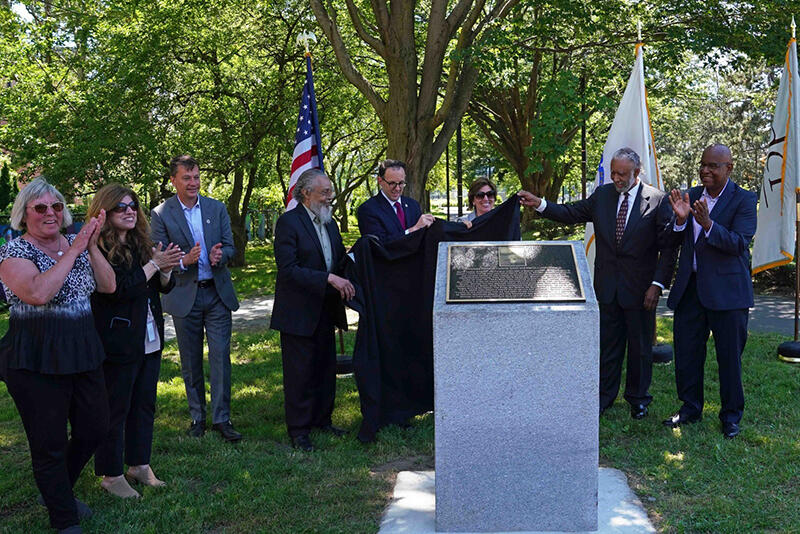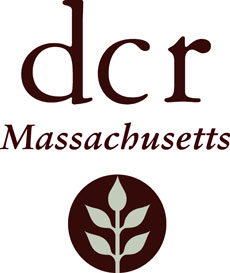- Department of Conservation & Recreation
Media Contact
Chloe Gotsis, DCR Communications Director

Boston — The Healey-Driscoll Administration today unveiled a new marker commemorating civil rights leader Dr. Martin Luther King, Jr. and his wife Coretta Scott King’s newlywed home. The announcement was made by Energy and Environmental Affairs (EEA) Secretary Rebecca Tepper and Department of Conservation and Recreation (DCR) Commissioner Brian Arrigo, local officials, community members, and historians in Boston’s South End neighborhood.
The granite post and plaque marking the Kings’ newlywed home are located near 396 Northampton Street in the City of Boston. In 1953, the Kings moved into a one-bedroom rental in the former six-story Lincoln Apartments, where they lived for their first year of marriage. This area is part of DCR’s Southwest Corridor Park, a more than four-mile-long park that runs from Boston’s Back Bay to Forest Hills, linking several neighborhoods and providing recreational and cultural opportunities for residents and visitors. The plaque is one of several sites throughout the city that mark the Kings’ time in Boston including the Embrace monument honoring the couple that was unveiled earlier this year in Boston Common.
“Martin Luther King Jr. and Coretta Scott King shared a vision for equality for Massachusetts and the country,” said EEA Secretary Rebecca Tepper. “Their teachings and legacy continue to inform our policymaking, particularly as we look to advance environmental justice in our state. How we use our public spaces can be an act of justice – for generations to come, people will be reminded of the history of this site. The Healey-Driscoll Administration is committed to centering our work around Black and brown communities, and that starts by recognizing the legacy of the Kings in Boston.”
“We are proud that DCR can play a role in helping share the Kings’ treasured history in Boston,” said DCR Commissioner Brian Arrigo. “One of my goals at DCR is fostering the next generation of stewards for our beautiful parks, and this plaque is part of that – now generations to come will walk the Southwest Corridor and learn about the Kings’ love story and the indelible mark they made on our city.”
The Kings met and dated in Boston. Sunday, June 18, 2023, marked the 70th wedding anniversary of the Kings, who wed in 1953 at Scott King’s family home in Heiberger, Alabama. After spending that summer working at Ebenezer Baptist Church in Atlanta, King returned to Boston with his wife, where he was earned his Ph.D. at Boston University’s School of Theology, and she was gained her music education degree at the New England Conservatory of Music. During the remainder of 1953 and into 1954, the Kings’ home was a fifth-floor, one-bedroom unit of the Lincoln Apartments on Northampton Street. The apartment building was later demolished, and the Southwest Corridor Park was built where their home once stood.
In late 2020, documentary filmmaker, journalist, and historian Clennon L. King (no relation) approached DCR to inquire about marking the building’s footprint and preserving the site’s history. Working with Clennon King and former State Representative Byron Rushing, DCR completed the site marker earlier this month.
“As black parents, we’ve allowed so much of our history to remain hidden from our children, who desperately need it as armor,” said Clennon L. King. “But thanks to allies like the Commonwealth, this marker teaches them that this address and neighborhood are indeed holy ground-where two people who looked like them fell in love, committed themselves to a shared vision and changed the world forever.”
“We need to all thank Clennon King for keeping us focused on this important history: When Martin Luther King reached Boston in 1951, it was only the second time he had lived an extended time in the North,” said former state Representative Byron Rushing. “His two and a half years here was the last time he was able to solely work on his intellectual development. And he meets and falls in love with Coretta Scott and it changes their lives forever. This dedication is part of what the City and Commonwealth can do to tell the story of these important years for them and ultimately for us.”
Earlier this year, Boston City Councilor Tania Fernandes Anderson authored a resolution establishing a King’s Heritage Trail in Boston, which received unanimous approval in late March, and was signed into law by Mayor Michelle Wu. The walking trail will include sites that were memorable to the Kings’ time in Boston including the Urban League of Boston on Whittier Street that helped Coretta secure employment, the former location of the Twelfth Baptist Church on Shawmut Avenue, where Martin Luther King was an assistant minister, and the League of Women for Community Service, Coretta’s second Boston residence on Massachusetts Avenue.
Today’s event also included state Representative John Moran and representatives from Sen. Liz Miranda’s Office, as well as Michael C. Powell, whose mother, the late Mary Louise Powell, introduced the Kings.
“I am proud to see this plaque unveiling, which uplifts and recognizes the deep and often untold history of Boston,” said state Sen. Liz Miranda. “Dr. Martin Luther King Jr and Coretta Scott King spent formidable years in our Commonwealth, living in this apartment for about a year after their 1953 marriage. Dr. King referenced his Northampton Street address in many 1954 letters and this place is recognized as where they began their lives as newlyweds.”
“This plaque is such a wonderful way of carrying on the memory of these two civic rights icons,” said state Rep. John Moran. “It will enable generations of Bostonians who traverse the Southwest Corridor Park to pause for a moment and reflect on the tremendous legacy of Dr. King and Coretta Scott King.”
The new plaque reads:
Newlywed Home of Coretta Scott and Martin Luther King, Jr.
Martin Luther King, Jr. and Coretta Scott met in Boston and had their first date in January 1952. During their courtship, Martin moved to 397 Massachusetts Avenue, and Coretta moved to The League of Women for Community Service at 558 Massachusetts Avenue. They married in Heiberger, Alabama at Coretta’s family home on June 18, 1953. When they returned to Boston, they moved into Apartment 5 in the six-story Lincoln Apartments on this site at 396 Northampton Street. Sharing this one-bedroom rental, Coretta graduated from New England Conservatory of Music, while Martin completed his Boston University residency and began writing his thesis. The Kings left Boston for Montgomery, Alabama in July 1954, where they began a shared life of service and advocacy. Coretta wrote, “I came to the realization that we had been thrust into the forefront of a movement to liberate oppressed people, and this movement had worldwide implications. I felt blessed to have been called to be a part of such a noble and historic cause."
DCR will continue to maintain and preserve the area around the historic marker.
###
